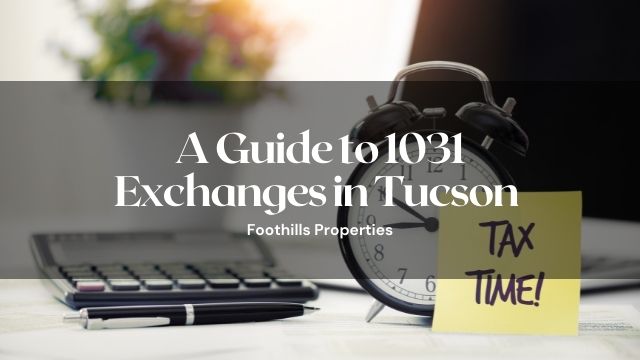
A 1031 Exchange gets its name from the Internal Revenue Code (IRC) Section 1031. It refers to an exchange of one investment property for another. In the process, this allows an investor to defer payment of capital gains tax.
If you're a Tucson property investor or thinking of investing in Tucson real estate, being able to defer capital gains tax can mean freeing up more capital for another investment.
As such, a 1031 Exchange is arguably one of the best methods for building wealth over time.
You have to get the process right, though. If you don’t, the process will not only fail, but you may end up being liable for a hefty tax bill on the capital gains. To help you, we've put together a basic overview of the process.
What Kinds of Properties Qualify for a 1031 Exchange?
A 1031 Exchange is only reserved for certain properties: those that are held for productive use in a business or for investment purposes.
The following are examples of real properties that would qualify, so long as they're held for investment purposes:
- A commercial building
- A vacant lot
- An apartment building
These types of properties are like-kind and share the same nature or character even if they differ in grade or quality.
Non-property investments such as stocks, securities, interests, and bonds don't qualify.
Are there exchange deadlines in a 1031 Exchange?
Yes! Prior to the 1984 amendment, the exchange of properties used to occur simultaneously. However, this led to a number of issues. One such issue was the difficulty of finding a replacement property and transferring it all at once.
Today, thankfully, that problem doesn't exist. Still, investors are required to follow a set of strict deadlines for a successful exchange.
First and foremost, you’ll need to list and market the property that you want to relinquish. But unlike a normal sale, you’ll need to hire a professional to keep the sale funds on your behalf. Such a person is called a qualified intermediary.
A qualified intermediary is a person who enters into a written agreement with the exchanger (you) to facilitate the transfer of proceeds.
In other words, they're the middleman between the buyer and seller of properties.
.jpg)
The intermediary can be a real estate agent, an accountant, or an attorney. You must not maintain any relations with them in any way.
What is the 45-Day Rule?
In a Delayed Exchange, you’ll have 45 days to identify a replacement property after you’ve closed on the property you’re relinquishing. This period isn’t optional and includes both weekends and holidays.
Section 1031 of the IRC gives investors three options for replacement properties. You can also replace your one property with multiple replacement properties, as long as their aggregate value doesn’t exceed 2X the relinquished property’s value.
What is the 180-Day Rule?
Besides the 45-Day Rule, investors must also adhere to the 180-Day Rule as well. It’s also concrete; there are neither exceptions nor extensions. The rule states that the total transaction must occur within 180 months after the process began.
The countdown begins from day the relinquished property was transferred to when the replacement property transfer is closed.
What is Boot and How Does It Occur?
The term boot refers to non-like-kind property received in an exchange. Typically, boot is in the form of cash, personal property, debt relief, or an installment note, and is valued at the “fair market value” of the non-like-kind property received.
For example, let’s suppose you sell a property for $250,000 and only reinvest $200,000. The difference ($50,000) is what would constitute a boot.
.jpg)
Any boot received in a 1031 Exchange is regarded as a taxable gain. And resultantly, that will trigger a taxable event. Boot can occur in any of the following ways:
Cash proceeds. This can occur in two main ways: if you fail to transfer 100% of the sales proceeds or fail to utilize 100% of the sales proceeds in purchasing the replacement property.
Personal property. Personal property such as furniture and appliances can also constitute boot. That’s because these are considered personal property rather than real property.
Non-like-kind property. In a 1031 Exchange, only like-kind property qualifies for an exchange. So, including a non-qualified property will also constitute boot.
Mortgage reduction. Even without receiving cash back, mortgage reduction or debt can also create boot. For instance, if the debt on the replacement property is less than that of the relinquished property.
Do Vacation Homes Qualify for a 1031 Exchange?
Yes and no! Your vacation home will not qualify for a 1031 Exchange if your home is used primarily for personal use.
However, under IRC Section 1031, a vacation property can qualify if the following requirements are met. For two years after conducting the exchange, you must:
Rent out the home for a minimum of fourteen days every year, and use the vacation home for personal purposes for a maximum of fourteen days every year (or ten percent of the actual time you rent out the property every year, whichever is greater).

What Are Other Types of 1031 Exchanges?
There are four types of 1031 Exchanges. They are as follows.
Delayed Exchange. This is the most common, and follows the exact steps mentioned above.
Simultaneous Exchange. This requires that the relinquished property and the replacement property are exchanged simultaneously. This is the original version of a 1031 Exchange.
Reverse Exchange. This is the exact opposite of a Delayed Exchange. It requires that the replacement property be purchased before the relinquished property is sold.
Improvement Exchange. This is also known as a “build-to-suit” or “construction” exchange. In order to achieve a tax-deferred transaction, it requires the exchanger to trade “across” or “up” in debt and equity.
A 1031 Exchange is a great way to create wealth. And while it doesn’t eliminate your capital gains tax, you may be able to grow your investment portfolio significantly without ever incurring a tax liability.
If you need help growing your investment property portfolio or managing your rental properties in Tucson, contact Foothills Properties today.








